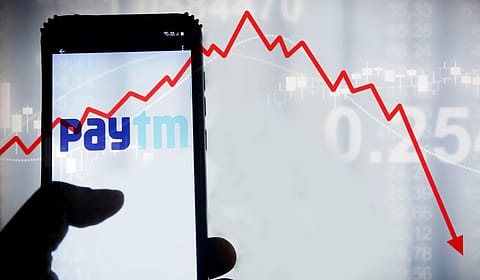Paytm to buy back shares worth ₹850 cr at 50% premium; stock falls 3%
The board of Paytm has approved a share buy back plan at ₹810 apiece, a premium of 50% as compared to current market price, to encourage shareholders to sell the shares back to the company.

Shares of Paytm parent One97 Communications dropped 2.5% in opening deals on Wednesday after the payments solutions company announced buy back of shares at a whopping premium. The board of directors of the company has announced a buy back scheme worth ₹850 crore at ₹810 apiece, a premium of 50% as compared to the current market price of ₹540 on the BSE. The aggressive buy back comes at a time when the Paytm stock is trading at a significant discount to its intrinsic value. The repurchase of stocks from the shareholders would reduce the number of existing shares and push the price upward.
Paytm is one the worst performers among recent large initial public offerings (IPOs) and has eroded 75% of investors' wealth (from its issue price of ₹2,150) since its listing on November 18 last year. In the last one year, Paytm shares have delivered a negative return of 64% to its shareholders, while it has dropped 12% in the past six months and 16% in a month. The stock hit an all-time low of ₹439.60 on November 24, 2022, while it touched a record high of ₹1,961.05 on its listing day.
On Wednesday, Paytm share price opened 1.75% higher at ₹548.95, against the previous closing price of ₹539.50 on the BSE. The largecap stock soon pared its gains and dropped as much as 2.6% to hit a low of ₹525.60. The market capitalisation of Vijay Shekhar Sharma-led company stood at ₹34,625.76 at the time of reporting. In contrast, the BSE benchmark Sensex was trading 289 points higher at 62,822 levels, tracking firm cues from Asian peers and positive closing on Wall Street overnight.
In an exchange filing on Tuesday, Paytm said, “The company will undertake a buy back of up to ₹850 crores (excluding buyback taxes and other transaction costs) at a maximum price of ₹810 per share and has opted for the open market route through stock exchanges method, which is to be completed within a maximum period of six months.”
The offer will be executed through the open market route via the stock exchange method and the process is expected to be completed within a maximum period of six months.
At the maximum buy back price and the maximum buyback size, the indicative maximum number of equity shares bought back would be 10,493,827, which represents around 1.62% of the company's paid-up share capital as of March 2022, it said.
The company intends to utilise at least 50% of the amount earmarked as the maximum buy back size i.e. ₹425 crore for the buyback. Based on the minimum buy back size and maximum buy back price, the company would purchase a minimum of 5,246,913 equity shares, it said.
“The board has constituted the buy back committee to oversee and implement the buyback and has delegated powers to it to do all such acts, deeds, matters and things as it may, in its absolute discretion, deem necessary, expedient, usual or proper in connection with the proposed buyback,” as per the filing.
Earlier this month, Paytm founder and CEO Vijay Shekhar Sharma in an analysts meeting projected that its blended net payment margin, difference between payment revenues and processing charges, will stabilise at 5 to 7 basis points (bps) due to increase in the share of UPI in the payment business. He said the company currently earns a net payment margin of 7 to 9 bps of the gross merchandise value (GMV) on processing.
Sharma added the company will trend lower as percentage of GMV because of higher UPI in mix, as well as routing and rate optimisations. “From this quarter, postpaid charges will be in payment cost (was in promotional cashback and incentives earlier) which will have no impact on contribution margin,” he said.
Paytm made this analyst presentation days after the Reserve Bank of India (RBI) refused to grant payment aggregator licence to its subsidiary, Paytm Payments Services Limited (PPSL). The RBI has asked PPSL to re-submit its payment aggregator (PA) application within 120 calendar days. The central bank has also barred PPSL from onboarding new online merchants.
(INR CR)